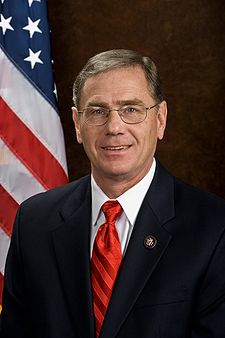Over the weekend, the U.S. House of Representatives voted along partisan lines in favor of an amendment sponsored by Rep. Blaine Luetkemeyer of Missouri (pictured at left) to cut funding for the Nobel Peace Prize winning Intergovernmental Panel on Climate Change (IPCC). When I flagged this incredible news on my Discover blog, the clean energy activist Michael Noble tweeted back: “Gone, even that old refrain: ‘needs more study.’”
The more I think about it, the more profound that little remark becomes.
Time was when I, and many others tracking and critiquing the climate “skeptics,” would linger on their manufacture of uncertainty, their sowing and merchandising of doubt. “Doubt is our product,” as the infamous tobacco memo put it.
Up through “Climategate” and the ensuing attacks on the IPCC over matters like the Himalayan glaciers blunder, the resistance to climate science really was well captured by this broad strategy. The central theme was that there was a body of science being produced by experts, and those who didn’t like its findings were problematizing, nitpicking, fighting around the edges while ignoring the big picture.
The ultimate effect was both sowing confusion—as average citizens were prompted to throw up their hands, unsure who to believe—and creating delay—as uncertainty was used as an excuse for doing nothing about the climate problem.
The administration of George W. Bush epitomized a strategy of doubt-mongering when it comes to climate change. In 2001 the president even commissioned a National Academy of Sciences review of the state of climate science–seeking to determine whether the IPCC was trustworthy–and then proceeded to misrepresent the NAS‘s strongly pro-IPCC findings as an excuse to do nothing on the issue.
As Bush put it in 2004, in a written response to questions from Science magazine: “In 2001, I asked the National Academy of Sciences to do a top-to-bottom review of the most current scientific thinking on climate change. The nation’s most respected scientific body found that key uncertainties remain concerning the underlying causes and nature of climate change.” You don’t find a better example of manufactured uncertainty than that: The NAS report in question actually strongly supported the scientific consensus on human-caused global warming.
Meanwhile, throughout the Bush administration political appointees massaged the science, controlled the message—but they were never so bold as to pronounce that all of climate science was wrong and corrupt, and not even worthy of our consideration any longer.
But that’s not really what you see out there anymore. A decision to defund the IPCC, rather than attack or criticize it, doesn’t bespeak a strategy of doubt-mongering. It signals extreme certainty that one is right, that we don’t even need to consider (skeptically or otherwise) any more new results from climate scientists.
So, for that matter, does the recent elevation and anointment of James Inhofe as the de facto GOP expert on climate science–implying that somehow his early, pioneering skepticism has been decisively vindicated by events.
The logic now appears to be: “There was this thing called the IPCC whose findings were dubious and repeatedly called into question. Then came “Climategate,” which validated our suspicions, proving that the IPCC (and all the science it produced) was utterly corrupt. Thus, there is nothing to global warming but a cesspool of politicized science, and it can all be dismissed. No need even to spend taxpayer dollars studying it any longer.” (Interestingly, it appears that Rep. Luetkemeyer, who sponsored the anti-IPCC amendment, has exaggerated how much money the U.N. body receives from the U.S. government by a factor of 5 or more.)
Don’t get me wrong: I know those attacking climate science never really believed it, and were probably always as sure of themselves as they appear now. Nevertheless, they’ve now been dramatically emboldened—they’re willing to go much farther. They don’t feel the need to behave as the Bush II administration did, at least leaving the door open in a rhetorical sense. Now, they’re slamming it shut.
Where we once had climate “skeptics”—always preserving the scare quotes–now we really do have deniers.
Subscribe to our newsletter
Stay up to date with DeSmog news and alerts






